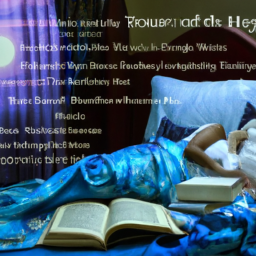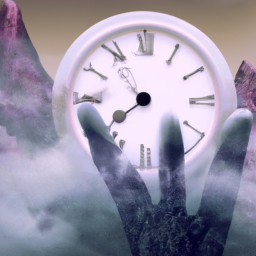Dreaming of death is more often a sign of transformation than a warning. It reflects internal changes, endings, or new beginnings rather than impending danger. Cultural perspectives sometimes see these dreams as messages from ancestors or symbols of growth, while psychological views suggest they highlight personal fears or upcoming crossings. Recognizing whether your dream indicates change or caution depends on your feelings and life context. Exploring these nuances may reveal deeper insights into your subconscious journey.
Key Takeaways
- Cultural and psychological perspectives often interpret death dreams as symbols of personal transformation rather than literal warnings.
- Such dreams may indicate ending a life phase, prompting growth, change, or new beginnings.
- Emotional responses to death dreams vary; they can evoke fear or serve as gentle reminders of necessary change.
- In some cultures, these dreams are seen as messages from ancestors or spiritual guides, emphasizing guidance during transitions.
- Overall, death dreams commonly symbolize inner change and renewal, not necessarily an imminent threat or warning.

Have you ever woken up feeling unsettled after dreaming about death? These kinds of dreams can leave you feeling shaken, questioning their meaning, and wondering if they hint at some impending change or danger. Understanding what dreaming of death signifies isn’t always straightforward. It’s essential to contemplate both cultural interpretations and psychological insights to get a clearer picture. Different cultures interpret these dreams in unique ways. In some societies, dreaming of death symbolizes an end, but also a new beginning—like a rite of passage that ushers in transformation. For example, in certain African and Asian traditions, such dreams are seen as messages from ancestors or spiritual guides, indicating that a phase of life is closing and a new one is about to start. Conversely, Western perspectives often view death dreams more ominously, as warnings of loss, failure, or significant stress. Yet, regardless of cultural background, many interpret these dreams as an opportunity for self-reflection rather than a literal prediction of death. Psychological research shows that contrast ratio plays a critical role in how vividly and clearly images are perceived in dreams, affecting their emotional impact. From a psychological standpoint, dreaming of death frequently reflects internal states and subconscious thoughts. Psychologists often see these dreams as symbols of personal transformation rather than portents of physical demise. They might represent the end of a particular chapter in your life—like finishing a job, ending a relationship, or letting go of old habits. Such dreams could also reveal fears about change or feelings of loss that you haven’t fully acknowledged. Sometimes, they surface when you’re experiencing stress or anxiety, especially during periods of uncertainty. Your mind uses the symbolism of death to process these complex emotions, helping you prepare mentally for shifts ahead. Additionally, dream symbolism can influence how these dreams are experienced emotionally. It’s not necessarily about fearing death itself but about confronting the idea of change and growth. These dreams serve as a reminder that endings are often necessary for new beginnings, even if they’re uncomfortable at first. Recognizing that personal transformation is a common theme in these dreams can help you interpret their meaning more compassionately and accurately. Moreover, understanding the psychological insights behind such dreams can assist in managing emotional responses and fostering resilience. Ultimately, dreaming of death can be seen as a mirror of your inner world, highlighting your fears, hopes, and readiness for change. Cultural interpretations provide a broader spiritual or societal context, while psychological insights focus on your personal emotional landscape. Recognizing this dual perspective can help you interpret your dreams more compassionately and accurately. Instead of feeling disturbed, you might begin to see these dreams as signals that transformation is underway—an essential part of your journey forward. Whether as a warning or a symbol of renewal, dreaming of death invites you to reflect on what’s ending and what’s emerging in your life, encouraging growth and resilience amid uncertainty.
Frequently Asked Questions
Can Dreaming of Death Predict Real-Life Events?
Dreaming of death can sometimes hint at upcoming changes, but it’s not a direct prediction. In dream analysis, symbolic interpretations suggest these dreams often reflect personal transformation or fears rather than specific events. You might see death as a sign of growth or ending old habits. While dreams can offer insights, they shouldn’t be relied on to predict real-life events—they’re more about understanding your subconscious feelings.
How Do Cultural Differences Influence Death Dreams?
You should consider how cultural differences influence death dreams through cultural symbolism and death rituals. Your background shapes how you interpret these dreams—some cultures see them as messages or warnings, while others view them as transformation. By understanding your cultural context, you can better comprehend your dreams’ meanings, recognizing that they reflect personal beliefs, societal norms, and traditional rituals surrounding death. This insight helps you interpret your dreams more accurately.
Are Death Dreams More Common During Stressful Periods?
During stressful periods, you’re more likely to have death dreams because your subconscious fears surface, making grief processing more intense. These dreams reflect your emotional state and can serve as a way for your mind to confront underlying anxieties. Stress heightens your awareness of loss and change, so you might wake up feeling unsettled, but these dreams often help you process grief in a symbolic way, aiding emotional healing.
What Psychological Factors Contribute to Death-Related Dreams?
You might find that psychological interpretations of death-related dreams often link to your subconscious fears and emotional states. Stress, anxiety, and unresolved conflicts can trigger these dreams, reflecting deep-seated worries. Your mind processes feelings of loss, change, or fear of the unknown during sleep. Recognizing these psychological factors helps you understand that such dreams are not necessarily warnings but signals of your inner emotional landscape.
Can Recurring Death Dreams Indicate Underlying Health Issues?
They say, “A problem shared is a problem halved.” Recurring death dreams can sometimes signal underlying health issues, especially if they trigger intense emotions or disrupt your sleep. These dreams may also reflect subconscious fears or grief processing. While they might be a normal part of emotional processing, consulting a healthcare professional is wise if they persist, as they could indicate unresolved concerns needing attention.
Conclusion
So, next time you dream of death, ask yourself—are you on the brink of transformation or facing a hidden warning? It’s a mystery that only you can unravel, and the answers might just change your life. Will you embrace the change or ignore the signs? The choice is yours, but remember, sometimes the most profound shifts start with a single, haunting dream. Are you ready to discover what it truly means?









